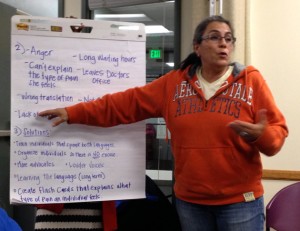By Megan Burks
The meeting itself drove home the necessity of interpretation.
Outfitted with headsets receiving signals from several interpreters, residents speaking seven languages met in City Heights Friday to coordinate a campaign to improve access to interpreters at doctors’ offices and hospitals.
At the start, members of the Karen (Burmese), Somali, Somali Bantu, Eritrean and Ethiopian communities huddled within arm’s reach of their designated interpreters. By the end, the attendees’ allegiances weren’t to their languages, but to their missions.
Some would circulate petitions. Others would talk to the media or plan lobbying trips to Sacramento.
The alliance grew out of the news that state Assembly Speaker John A. Pérez has introduced a bill that would draw down federal dollars to pay for medical interpretation services. A similar bill failed last year.
AB 1263 doesn’t differ much from last year’s proposal. It would create a system called CommuniCal to certify and register medical interpreters and reimburse their services.
What’s changed is the context in which it’s been introduced.
The Affordable Care Act will extend Medi-Cal coverage to 1.4 million Californians in the coming years, including a substantial amount of non-native English speakers. That expansion will heighten the need for medical interpretation, which providers and patients say is already not being met.
Residents in City Heights, where thousands of refugees arrive each year, drew attention to the issue last year with stories of misdiagnoses and medical complications resulting from language barriers. A survey conducted by residents in the groups City Heights Hope and Mid-City CAN showed 75 percent of respondents felt communication was very poor between them and their doctors.
Though California and federal laws have long required language services for patients who aren’t proficient in English, the mandate has gone unfunded. That means an unregulated patchwork of trained interpreters, bilingual staff, adult family members and children have filled the gap for patients.
 Carmen Chavez and other San Diego residents are gearing up to campaign in support of AB 1263, a bill that would increase access to trained medical interpreters. | Photo Credit: Megan Burks |
Carmen Chavez, a freelance Spanish-speaking interpreter who attended the meeting, said she’s been unofficially tapped by staff at her mother’s senior care facility to relay private health information for other Spanish-speakers.
“I’m shocked California is so behind the times,” said Chavez. “I just assumed it was part and parcel of what they did.”
California is also behind states like Oregon and Minnesota when it comes to ensuring interpreters are properly trained. While some professional organizations list vetted interpreters, there’s no universal requirement that interpreters prove they’re certified.
And Katharine Allen, who owns a private interpreting company in Bishop, Calif., said national interpreter groups have only recently developed certification tests.
“There’s a certain elite layer of people who are certified and professional, but that’s a minute number compared to the number of hospital staff providing interpreting,” said Allen, who also runs a forum for interpreters called InterpretAmerica. “It’s hugely important we start setting standards.”
AB 1263 calls for the State Personnel Board to develop a new certification test by July 2014. Those who pass would then populate a registry that would alert providers and patients of their eligibility to work under Medi-Cal.
But Allen said she worries that test would prove redundant in an industry already moving toward a national certification process. She said the state once had separate certification assessments for interpreters working on court and worker’s compensation cases, but has since dropped them.
She also doubts a new test would be ready within a year and worries about a bottleneck of interpreters eligible to serve when health reform opens a floodgate of newly insured patients.
The authors of the bill did not respond to requests for comment.
AFSCME, a national public services employees union, and the California Pan-Ethnic Health Network back the bill.
The residents coming together in City Heights haven’t started talking about ways they’d like to see the bill evolve as it makes its way through the legislature. For the diverse group, just talking to one another is the first step.
“Your issue is my issue,” Chavez told the crowd at Friday’s meeting.
After a slight delay for interpretation, the group erupted in cheers.
Update: Steven Maviglio, a spokesman for Assembly Speaker Pérez’s office, said AB 1263 won’t necessarily reinvent the wheel when it comes to certifying medical interpreters. He said the State Personnel Board would be encouraged to utilize existing exams by national interpreter groups. But Maviglio said it’s important the state has an independent certification process since the profession deals with patient care.
Maviglio also said a corps of certified interpreters will be ready in time for the Medi-Cal expansion. He said SPB would certify individuals who have already been working in the field for two years or have graduated from a medical interpreter training program at an accredited college or university before Jan. 1, 2014.
